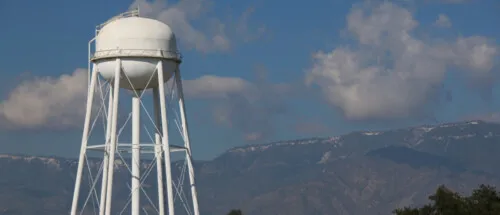If spotty glasses and faucet buildup are putting a damper on your water experience, you might be wondering, “Do I have hard water?” It’s important to find out, because hard water is more than just an annoyance. It can also lead to costly pipe and appliance maintenance.
Whether you’re dealing with chalky mineral deposits on your shower head or limescale buildup threatening your pipes, we’ll walk you through solutions to get rid of hard water. From traditional water softeners to modern filtration systems, and even some surprisingly effective DIY hard water fixes, we’ve got you covered.
In this article:
What Is Hard Water?
If you notice a filmy residue on your dishes or feel like you can’t quite rinse the soap off your hands, you may be dealing with hard water in your home. Hard water is water that’s packed with minerals like calcium, magnesium, and sulfates. While minerals in your water may sound like a good thing, too many can cause issues as they quietly build up in pipes. Minerals can also shorten the lifespan of appliances and be problematic for your skin and hair.
Causes of Hard Water
As water travels in the ground through soil and rock, it picks up naturally occurring minerals. Water that sits in wells also takes in surrounding sediments. It’s not uncommon to have hard water, as it is present in as much as 85 percent of household water in the United States.
Signs You Have Hard Water in Your Home
If you know what to look for, you’ll be able to notice signs that you have hard water in your home.
-
- Do you see heavy film, spots or stains on your dishes even after a thorough wash?
-
- Do you find your hair drying out quickly or color treatments fading faster than usual?
-
- Do you have frequent plumbing issues?
These are just a few of the indicators that you might have hard water in your home. For more tips on identifying hard water, check out our deeper dive into the signs of hard water.
How to Test for Hard Water
If you suspect you might be dealing with hard water and want to know for sure, testing your water can help you get confirmation. There are a few ways to do this: a DIY method, using a TDS meter, using a water testing kit, and hiring a professional.
Simple DIY Test
Take a clear water bottle and fill it halfway with water. Add a few drops of soap (avoid soaps with dyes or perfumes for the best results), then shake the bottle vigorously for 15-30 seconds. If clear bubbles form in the mixture, you’re in the clear. But if it turns cloudy and doesn’t produce many bubbles, you might be dealing with hard water.
TDS Meter
A TDS (Total Dissolved Solids) meter is an affordable and quick way to measure the amount of dissolved particles in your water, which includes hard water minerals. Dip the meter into a glass of water and it will provide a reading in parts per million (PPM). If your reading comes back above 300 PPM, you may be dealing with hard water. However, there isn’t an exact correlation between TDS and hard water, so additional testing is recommended for confirmation.
Water Testing Kit
These kits include test strips and/or tubes that change color in reaction to the water’s chemical makeup. You can use them to test for water hardness, pH levels, or even chlorine. While water testing kits can provide a general picture of water quality, they are not as detailed as a professional analysis.
Hire a Professional
The best option for a thorough and accurate test of your water quality is to hire a water treatment expert. They will assess the full spectrum of your water’s hardness, identify any contaminants, and recommend solutions tailored to your specific needs. If you need expert assistance, contact Leaf Home Water Solutions for a free water quality assessment.
6 Solutions to Get Rid of Hard Water
If you confirm that you do have hard water, there are many methods you can use to treat it:
1. Salt-Based Water Softeners
Salt-based water softeners use salt to reduce minerals like calcium and magnesium that make water hard through a process called ion exchange. These softeners are very effective for reducing buildup in pipes and fixtures. To use them, you simply connect the softener to your home’s water supply and, as the water flows through the system, the minerals are exchanged for sodium ions. The process is pretty low-maintenance—simply refill the salt tank when it runs low. Just keep in mind that salt-based water softeners need to be replenished regularly.
2. Salt-Free Water Conditioners
Adding more salt to household water is not ideal for everyone, especially those who may be watching their sodium intake. That’s when a salt-free water conditioner may be an effective option. Salt-free systems don’t remove the minerals; instead, they change their structure, preventing them from bonding and creating buildup. These systems require minimal maintenance and don’t need refills (since they don’t contain salt).
3. Reverse Osmosis Systems
If you’re looking to improve the taste of your water, a reverse osmosis system might be right for you. Reverse osmosis works by pushing water through a thick membrane that forces the minerals out and filters many impurities, resulting in better-tasting drinking water. Reverse osmosis systems are generally installed in one area of the home—like under the kitchen sink—so they aren’t the best option if you’re looking to treat the water in your entire home.
4. Carbon Filtration Systems
Carbon filters are very affordable and effective, making them a popular option for water filtration. These filters primarily target chlorine, chloramine, and organic compounds, improving the taste of water and removing bad smells. However, carbon filters don’t totally get rid of hard water; they just make it a little bit softer and more palatable.
5. Boiling Water
Boiling water can cause minerals to flee the scene and direct them back into the air. This is an effective method for small batches of water, like when using an electric kettle for making coffee.
6. Vinegar Rinse
The acidic quality of vinegar makes it a great weapon against mineral buildup in dishwashers, water heaters, sinks, and kettles. It never hurts to run vinegar through appliances for a temporary improvement—but it doesn’t get rid of hard water, and you’ll have to repeat the process every few weeks or months.
Preventing Hard Water Issues
Hard water and buildup can be frustrating, but with regular maintenance and the right home system, hard water is completely treatable.
Regular Maintenance Tips
Leave hard water buildup behind with simple regular cleaning and maintenance:
-
- Treat Faucets and Showerheads: Soak showerheads and faucets with vinegar (remove them first to make it easier if possible).
-
- Replace Filters: Regularly replace the filter in your water softener or existing system to prevent buildup and maintain water quality.
-
- Testing: Ensure your water filtration system is working by testing your water quarterly or semi-annually.
Choosing the Right System for Your Home
Softer water in the home can lead to improved appliances, cleaner dishes, shinier hair, and healthier skin. When choosing the right type of water treatment for your household, consider a system that matches your water’s hardness level and your household water usage. Understanding your needs will help you decide which long-term solution makes the most sense for you.
Explore Leaf Home Water Solutions treatment options to find the best system to achieve your water goals and enhance your water experience.
Frequently Asked Questions
Do hard water filter shower heads really work?
Hard water filter shower heads are helpful for removing chlorine and other chemicals, but they are not designed to remove the main culprits of hard water: calcium and magnesium. We recommend addressing hard water with a whole-home solution and softener.
How can I get water spots and hard water off of stainless steel appliances?
Streaks on your stainless steel appliances can easily be removed with a mixture of white vinegar and water. Apply the mixture to a damp cloth (or use a spray bottle) and wipe the appliance along the grain.
How do I remove hard water buildup from a dishwasher?
The easiest way to remove hard water buildup from your dishwasher is with vinegar, because the acidity will help break down mineral deposits. For best results, simply place a bowl of vinegar in the top rack of an empty dishwasher and run the appliance at the hottest setting.




